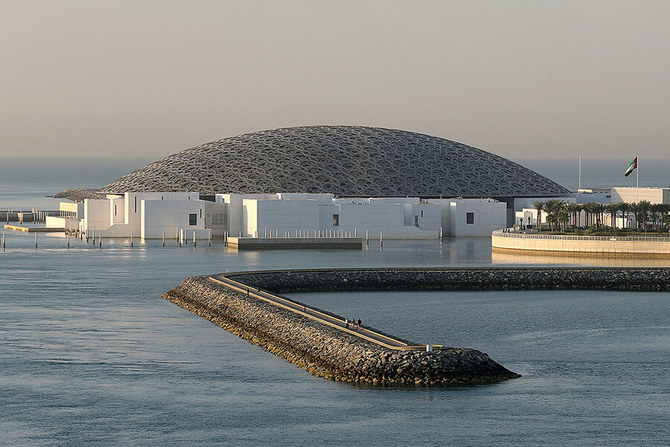
- ARAB NEWS
- 13 Jul 2025

When the Nasdaq started trading in 1971, few would have believed that, 50 years later, an Abu Dhabi-backed company headquartered in New York would strike the largest IPO on the US stock exchange this year.
GlobalFoundries, the world’s third-largest semiconductor manufacturer, was created by Mubadala just 12 years ago. Today, it is at the forefront of technology, reshaping the way we live — from smartphones to satellites to keyless car systems. With more than 50 university, research institute or government-led partnerships, it exemplifies the UAE’s desire to exchange knowledge, skills and ideas on a global stage.
This determination to reshape the future is everywhere.
Look no further than 10 Downing Street’s Terracotta State Drawing Room, the favored dining room of Britain’s first Prime Minister Sir Robert Walpole. There, in September, Prime Minister Boris Johnson and Abu Dhabi Crown Prince Sheikh Mohammed bin Zayed Al-Nahyan inked a £10 billion ($13 billion) five-year investment program. The focus: Innovation-led sectors such as technology, infrastructure, healthcare, life sciences and renewable energy.
The two leaders also stepped up bilateral relations in the energy transition and decarbonization, with a particular focus on renewables and new forms of energy. Practically speaking, this will see the Abu Dhabi National Oil Company, Masdar and BP collaborate on, co-invest in and co-develop low-carbon hydrogen hubs and a decarbonized air corridor between the UK and the UAE.
It does not end there.
Masdar and BP will also develop, build and operate energy and mobility services in urban spaces, including clean fuels, energy efficiency, distributed renewables generation and energy storage.
Progress is not limited to the economy. Trade and investment relationships are also deepening cultural ties.
The Ministry of Culture and Youth signed an agreement with its UK counterpart to exchange expertise in cultural and creative industries. This builds on a deep well of experience, given the Louvre Abu Dhabi turns four this month.
Famed French explorer Jacques Cousteau, who is credited with discovering one of Abu Dhabi’s largest oil fields, would be impressed if he sailed his underwater exploration ship Calypso around Saadiyat Island today.
Cousteau would be equally impressed to hear that there are more than 600 French companies now working in the UAE — a number that has been increasing by roughly 10 percent annually in recent years.
It is by design that the UAE has established itself as the Middle East’s commercial capital. It offers two exceptionally vibrant financial hubs: The Abu Dhabi Global Market and Dubai International Financial Centre. Both are common law jurisdictions that have attracted some of the world’s leading institutions and are embracing the future through fintech and new forms of sustainable finance.
The UAE has become globally competitive and there has never been a better time to participate and invest in the UAE, or to see our great companies grow abroad.
As the world aims to recover from COVID-19, it is encouraging to see DP World register above industry growth, driven by its investments in the Asia-Pacific, India, Australia and Africa. It now serves customers in more than 50 countries across seven continents, reimagining the future of supply chains across the world.
Like DP World, building a business that prioritizes sustainability and its impact on the environment is a top priority for many of the UAE’s great companies.
In August, shopping and leisure specialist Majid Al Futtaim issued the first “penalty-only” sustainable loan in the region. The $1.5 billion financial instrument includes a gender diversity target for women to constitute 30 percent of board members and senior management roles, aligning with the global aims of the 30% Club.
Investors globally are increasingly integrating environmental, social and corporate governance factors into their investment decisions. The UAE’s capital markets in Dubai and Abu Dhabi are responding and applying global principles. They are primed for exciting futures.
Not only will government and state-owned companies seek listings, thereby deepening the liquidity in the market, but they will also provide the capital for key growth companies in the UAE. Fertiglobe, the joint venture between ADNOC and the Netherlands-listed OCI, is a case in point. It illustrates the progress of the UAE’s private sector economy, which attracted investment interest from a Singaporean sovereign wealth fund and major US institution.
In a global economy where money flows easily across borders, the UAE is focused on playing a leading role in developing a strong regulatory and financial crime framework.
Such efforts are paying off.
It is by design that the UAE has established itself as the Middle East’s commercial capital.
Ahmed Ali Al Sayegh
In September, a landmark partnership to tackle illicit finance was signed with the UK. This first-of-its-kind agreement builds on the UAE’s ongoing efforts to strengthen its national financial crime compliance framework and collaboration with partners on anti-money laundering and counterterrorist financing measures in the region and around the world, including through close cooperation and information sharing. The UAE is committed to advancing a clear and consistent framework that delivers an open, efficient, effective and globally integrated economy.
As we approach the 50th anniversary of the UAE’s founding on Dec. 2, 1971, it is right to pause and reflect. To look back. To take stock of what we have achieved. But as we look forward, let us remain steadfast in our vision and efforts to continue rewriting tomorrow.